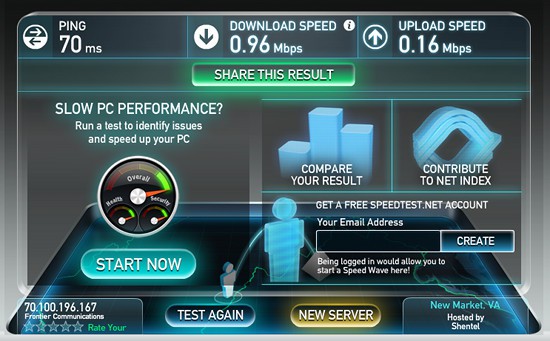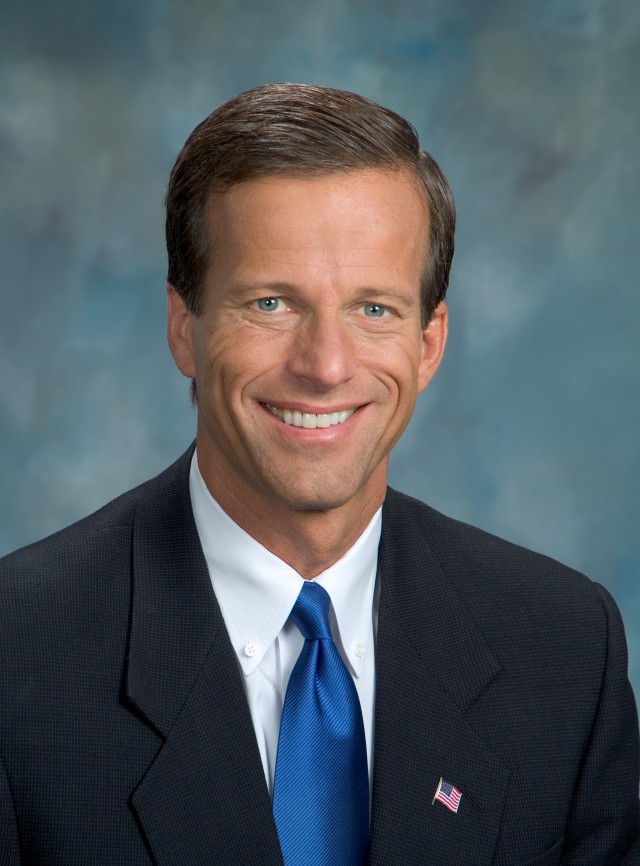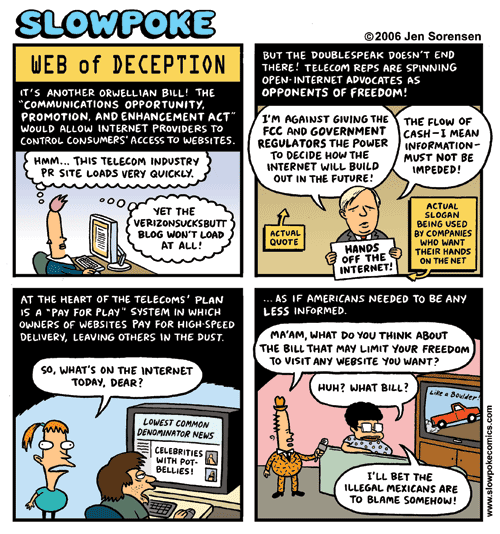 The Republican leadership of West Virginia’s House of Delegates is alleged to have quietly placed a ban on considering any bill that could potentially offend Frontier Communications, frustrating state lawmakers attempting to introduce broadband improvement and consumer protection measures.
The Republican leadership of West Virginia’s House of Delegates is alleged to have quietly placed a ban on considering any bill that could potentially offend Frontier Communications, frustrating state lawmakers attempting to introduce broadband improvement and consumer protection measures.
In a press release posted to his Facebook page, Delegate Randy Smith (R-Preston) complained that the House GOP leadership told him his two broadband-related bills waiting for consideration would “go nowhere because it would hurt Frontier.”
“Frontier has its hands in the state Capitol,” Smith said in the release obtained by the Charleston Gazette. “The company knows how to play hardball with the legislative process.”
When asked to name names of those obstructing his broadband-related measures, Smith declined, at least for now.
“It was one individual,” Smith said. “He said leadership wouldn’t support this because they feel like it’s targeting Frontier. If it comes to the point I have to, I’ll give names. I know you’re wanting names.”
Last December, Smith’s frustration with Frontier boiled over.

Smith
“For too long, West Virginia has lagged behind other states when it comes to accessible computer technology and infrastructure,” Smith said. “We’ve been offered excuses about our state being too mountainous for improving conditions here. But it’s not the state’s rugged terrain holding us back. Although a few areas of the state have a choice of service providers, most are stuck with whatever Frontier decides is enough. And not only do I receive complaints about their service, there are multiple grievances about how they bill their customers. We can, and must, do more to create competition to drive the quality of services up and drive costs down.”
“This is not a Republican or Democrat issue. This is a West Virginia issue,” Smith said. “And we need to catch up to other states in the 21st century.”
For the first time in 80 years, Republicans won a majority in the House of Delegates, pledging to transform West Virginia into a “business friendly state.” But even Smith, an assistant majority whip for the new Republican leadership, seemed stunned by the willingness to grant Frontier de facto veto power over telecom-related legislation.
- HB2551, co-sponsored by 10 GOP delegates, would prohibit Internet providers from advertising broadband service as “high-speed Internet” unless the company offered a download speed of 10Mbps or higher. The majority of West Virginia experiences real world speeds far slower than that from Frontier;
- HB2552, intended to address chronic billing problems by Frontier, would allow Internet customers to take billing disputes to Attorney General Patrick Morrisey’s office, if the state Public Service Commission refuses to review their complaints.

Speed tests on Frontier’s “High-Speed Max” Internet service aren’t high speed at all.
When Smith’s accusations went public in the pages of the Gazette, Republican leaders scrambled to deny his allegations.
House Majority Leader Daryl Cowles (R-Berkeley) told the Gazette House Republicans have no “blanket position” against bills that Frontier opposes.
“There’s no policy by leadership that these bills should move or shouldn’t move based on who’s supporting them or who doesn’t,” Cowles said. “It sounds like Randy is frustrated. He, like many out there, are frustrated by their Internet speeds and service.”
“I was told Friday that there’s no way those bills were going to run,” Smith countered.
Frontier won’t deny its disapproval of Smith’s bills.
“We’re the only provider that chooses to serve much of rural West Virginia, and we see the legislation as having a negative effect on further development of rural broadband services,” said Frontier spokesman Dan Page.
Frontier customers in West Virginia are among the company’s most vocal critics nationwide, complaining about unavailability of DSL, billing errors, poor service, and most common of all: selling service and speed the company cannot consistently deliver. A statewide class action lawsuit against Frontier for failing to provide advertised speeds has attracted hundreds of Frontier customers. The suit maintains Frontier has engaged in “false advertising,” a violation of the state’s Consumer Credit and Protection Act.
Smith introduced the two broadband measures partly out of his own frustration with the company.

Cowles
“I regularly conduct speed tests on my Internet connection and the results are laughable,” Smith told his mostly rural constituents. “I’ve had download speeds of around 0.20Mbps. No wonder they’re called Frontier. Those are the kinds of speeds you’d expect on the American frontier in the 17th century.”
Smith recognized some members of his own party will take Frontier’s side over his.
“Of course, my bills don’t go over well with some members of my own party,” Smith said. “But right is right and wrong is wrong.”
On cue, Cowles rushed to Frontier’s defense.
“Frontier has been trying to spend money to upgrade service, but it hasn’t been easy for those guys,” Cowles said. “We’re trying to expand broadband and improve the speeds everywhere we can. We try to nudge Frontier when we can, push them when we can, while we respect their investment.”
A considerable part of that “investment” came at the cost of U.S. taxpayers. Last fall, the U.S. Department of Commerce’s inspector general announced an investigation into how Frontier spent a $42 million federal stimulus grant in the state. The inspector general is reviewing thousands of pages of documents turned over by the company. Critics contend Frontier spent the stimulus funds to defray the cost of a statewide fiber network Frontier now owns and controls.
Cowles told the Gazette that despite the media attention on the issue, he remained unsure if Smith’s bills would ever reach the House floor for consideration.
At least three House members — two Republicans and one Democrat — work for Frontier.


 Subscribe
Subscribe


 Current FCC rules have allowed traffic shenanigans from ISPs like Comcast that don’t mind slowing their customers’ Netflix experience to a crawl until the streaming company opens its checkbook. The FCC’s anticipated new proposal would strictly forbid any creative end-runs around the concept of paid fast lanes Comcast can get away with today.
Current FCC rules have allowed traffic shenanigans from ISPs like Comcast that don’t mind slowing their customers’ Netflix experience to a crawl until the streaming company opens its checkbook. The FCC’s anticipated new proposal would strictly forbid any creative end-runs around the concept of paid fast lanes Comcast can get away with today.


 “Those who advocated the Telecommunications Act of 1996 promised more competition and diversity, but the opposite happened,” said Common Cause president Chellie Pingree back in 1995. “Citizens, excluded from the process when the Act was negotiated in Congress, must have a seat at the table as Congress proposes to revisit this law.”
“Those who advocated the Telecommunications Act of 1996 promised more competition and diversity, but the opposite happened,” said Common Cause president Chellie Pingree back in 1995. “Citizens, excluded from the process when the Act was negotiated in Congress, must have a seat at the table as Congress proposes to revisit this law.”
